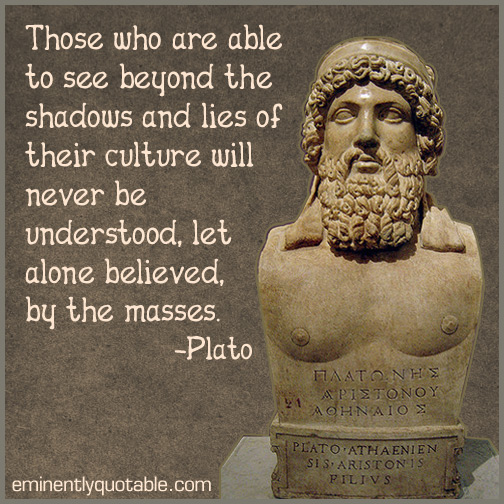
graphic © eminentlyquotable.com | photo – Wikipedia – lic. under CC-BY-SA-3.0
“Those who are able to see beyond the shadows and lies of their culture will never be understood, let alone believed, by the masses.” – Plato
Plato (427 – 347 B.C.E.) was an ancient Greek philosopher known for his theory of Forms, according to which the world we perceive through the senses is only an imitation of the pure, eternal, and perfect world of the Forms. Plato was a student of Socrates and a teacher of Aristotle.
Plato’s statement above joins him with a few other writers and philosophers who spoke about great minds being misunderstood. Friedrich Nietzsche declared, “Every deep thinker is more afraid of being understood than of being misunderstood.” In his book “Self Reliance,” Ralph Waldo Emerson wrote, “To be great is to be misunderstood.” Like Plato, these men were well beyond their time that their philosophies were considered preposterous by some, if not most, people in their period.
According to Dr. Leon Seltzer, there are 9 reasons why it’s so easy to be misunderstood; and to ordinary narrow minds, new concepts or unorthodox views can take a long time to be absorbed. Sometimes, the other person has rigid opinions or “isn’t able to take in any viewpoint other than their own.” The other reason could be that the other person might be less educated or sophisticated. We can’t really expect people to understand concepts they’re not accustomed to.
German philosopher Arthur Schopenhauer proclaimed: “The discovery of truth is prevented more effectively not by the false appearance of things present and which mislead into error, not directly by weakness of the reasoning powers, but by preconceived opinion, by prejudice.”
😳 What Tinnitus Does To Your Brain Cells (And How To Stop It)
After 47 years of studies and countless brain scans done on more than 2,400 tinnitus patients, scientists at the MIT Institute found that in a shocking 96% of cases, tinnitus was actually shrinking their brain cells.
As it turns out, tinnitus and brain health are strongly linked.
Even more interesting: The reason why top army officials are not deaf after decades of hearing machine guns, bombs going off and helicopter noises…
Is because they are using something called "the wire method", a simple protocol inspired by a classified surgery on deaf people from the 1950s...
★ How To Get Rid Of Nail Fungus:
★ Does Your Salad Contain This Vegetable?
★ Top 10 Most Valuable Medicinal Herbs:





